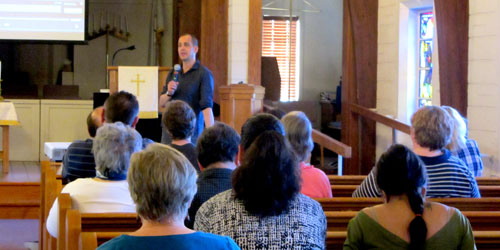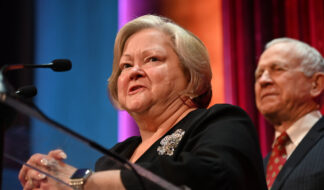By Crystal Proxmire

LANSING –
How can we help people we love who are voting against us because they feel torn between acceptance and their faith?
That was the question addressed by the Inclusive Justice in Lansing on May 14. The event brought documentary director and media specialist Macky Alston to speak on making the connection between God and the saving grace of the gay community – the ultimate rule of love.
The day-long conference included workshops, lessons, dinner-time discussions and a screening of Alston's film Love Free of or Die, which followed Bishop Gene Robinson, who was the first openly gay man consecrated by the Episcopal Church. Robinson was elected Bishop in 2003, but not without controversy. The film capped off a day of education on reaching the 'movable middle.'
"My daddy was a Presbyterian minister," said Alston in quick-spoken Southern drawl. Having been born in Alabama and raised in North Carolina, Alston has seen plenty of 'Conflicted Christians,' his father among them.
The work required to figure out his father's fears, and the barrier that countless other Christians face, has taken him around the world doing studies, documentaries and trainings. Recently through his work at Goodwin Simon Research and Auburn Media in New York, he embarked on a study in Michigan, to help teach Michiganders how to increase acceptance in this state. Their findings were among the highlights of his presentations.
"We did an audit of how the conversation was happening in Michigan," he said. "We asked people 'what do you think of gay marriage?' and it takes about this long [snaps fingers] before it turns into a moral, or religious, discussion."
The researchers used focus groups provided by a marketing company with a 'general population' sampling. They watched from behind a two-way mirror while average people had the gay marriage discussion. "It was horrible," Alston said. "But we learned a lot about what people think."
Auburn Media also did a media survey, looking at news postings to judge for fairness and public comments to judge how people are framing conversations. They also held roundtable discussions with church leaders who were Catholic or Protestant.
The conclusion is that love is the answer.
"If you set up a debate between moral and secular reasons, and people are torn, people will default to their moral choice," Alston said. "Don't frame it as a choice. Show them how acceptance fits with their belief about God."
"There is an untapped opportunity to rise up to supportive religious frames: God is welcoming, love thy neighbor, thou shall not judge."
Secular arguments, such as deductive reasoning, appeals to fairness, discussions of what equality means, and legal-based arguments just don't hold enough weight to convince a Christian to potentially cross God.
"Secular arguments are insufficient and are experienced as dismissive of their faith," Alston said. According to Alston's research, when most people argue in support of gay marriage, they tend to use secular arguments, or mix secular and religious, or even anti-religious in general. He noted that in North Carolina, where people recently voted to deny marriage to gays and lesbians, the issue was framed as secular versus religious, with few voices addressing both.
One barrier to be crossed is showing that gay couples are just as loving and committed as heterosexual couples can be. "Conflicted Christians tend to believe heterosexual relationships are about love and commitment and that same-sex relationships are only about sex. When 'sex' is embedded into the way we frame ourselves, we reinforce the image of 'the sexual other'."
Instead of being defensive or argumentative, Alston recommends "Find things you have in common: your children, your values. Don't push your agenda. Be part of their 'in group.' …Use a clear moral framework based on Christian values… Remind Christians that God is love."
The seminar also included an Interfaith LGBTQ Toolkit, which was published by the Michigan Unitarian Universalist Social Justice Network with a grant from the Community Foundation of Southeast Michigan. It gives resources to empower faith groups to strengthen their welcoming, advocacy and service on behalf of LGBTQ people, including websites that address many religious groups, resources within the LGBT community, and links to movies and short videos that help facilitate dialogue, and even change people's minds. The kit can be downloaded at http://www.uujustice.org/LGBTQ_Toolkit_Final_1-12.pdf.
One resource is a series of short videos that shows individual stories of conflicted Christians opening their hearts. Tom Nelson, PFLAG activist and author of An Ordinary Catholic, was among those featured in the series. Nelson was a conservative Catholic who used to be judgmental, but opened his heart to love after his gay son attempted suicide.
When conflicted Christians hear such stories, it can help them see the harm caused by judgment and the blessings that come from a heart full of love and acceptance for all God's creations.
"I know that God does not make mistakes," Nelson said. "What God taught me through my gay son has changed my life, and I am so blessed to feel God's love and wisdom."
One of the biggest lessons shared was how to tell personal stories in church and in the media to help spread the message of inclusion. "There is a long tradition of storytelling from the pulpit. Stories put your audience in the empathetic frame where they are most likely to accept new ideas. Facts alone make it more likely that the audience will raise objections," Alston said.
"What made the Treyvon Martin story so powerful?" he asked in reference to the recent shooting of a teenager on his way home from a convenience store. "It's the Skittles and the iced tea. It's that detail that makes it seem more real. Any of us could be buying Skittles or iced tea." Details, he said, help people remember and relate to the story.
He also explained the importance of keeping the message positive and staying on point. "When you defend the dominant message, you give strength to that," he said. "When others try to frame this as a religious issue, remind them that religion and acceptance go together." As he said earlier "God is welcoming. Love thy neighbor. Thou shall not judge."
When Alston's father came around to a place of support, he told his son "I didn't change my mind, my mind was changed by God."
Inclusive Justice is a state-wide, faith-based coalition, inclusive of all traditions that advocate for lesbian, gay, bisexual, transgender, queer and intersex persons' acceptance within religious and spiritual communities, and for the equitable treatment of all in local, state, and federal public policy. Find out more at http://inclusive-justice-together-in-faith.org.










